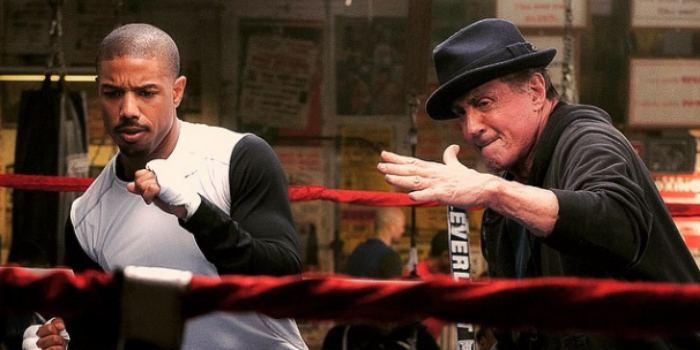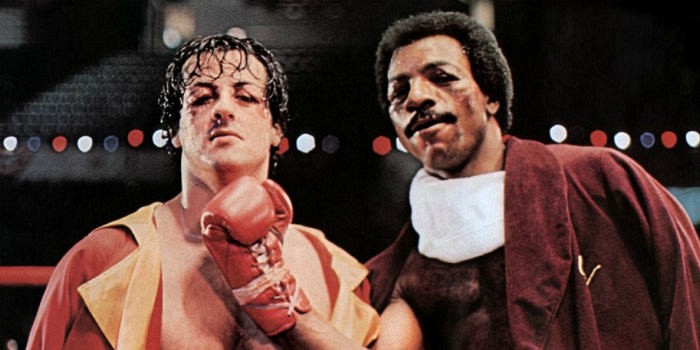In the Name of the Father, by Reed Lackey
17 Dec
Film franchises are far from rare, but what is rare is for a film franchise to still have something relevant and noteworthy to say once it crosses the second or third installment. What is even rarer about Creed is that it is part of a franchise which is original to film, is not set within a typically franchised genre, and manages to somehow retell the first story in a fresh way while also elevating the stories which followed at the same time.
I’ve always loved the Rocky movies. Many other franchises have been adapted from novels, comic books, video games, or even previous films. Even most of the other cinematic originals exist within a genre of horror or science fiction, which carries certain qualities fans already adore. But Rocky was an original screenplay, a dramatic character piece from the heart of Sylvester Stallone that was so pure and simple in its themes as to be nearly universal. It won the Academy Award for Best Picture in 1976, made a star of Sylvester Stallone, and spawned an entire series of sequels. But by the time Rocky IV arrived, beloved as that film is for its absurd awesomeness, the characters had largely become caricatures. I didn’t even manage to enjoy Rocky V.
But Rocky Balboa restored my faith in the character and his fictional little universe in Philly. When I saw that movie on Christmas day in 2006, I was so grateful for the series ending on a high note. So when I heard that Ryan Coogler, director of the emotionally devastating Fruitvale Station, was tackling a new sequel focusing on the son of Apollo Creed, I was on board almost immediately. Not only did I feel that the creative team in place had the potential to tell a truly compelling new story, but I felt like the concept in itself was the most natural place where the story could progress.
Because, while unquestionably the most important relationship in Rocky Balboa’s life is that of his wife Adrian, I feel that the most important character for the progression of Rocky’s story is Apollo Creed. It is Apollo who first gives the “nobody” Rocky a shot at fighting the champ. In the sequel, it is Apollo who Rocky first defeats to become the champion, and in Rocky III, when Rocky’s iconic trainer Mickey passes away, it is Apollo who pulls Rocky out of the shadows and trains him to fight again.
When Creed begins, Rocky Balboa has retired from the fighter’s life and Apollo Creed has long been gone, having died in the ring fighting the Russian behemoth, Ivan Drago. Adonis Johnson, the abandoned child of Apollo’s secret affair, is a born fighter. He fights often, although with no father figure in his life to show him why he should and how to do it well. Apollo’s widow, Mary Anne, rescues Adonis from a troubled youth, but even as an adult, he spends time viewing old fight footage of his father and shadow-boxing against it as an exercise. Against Mary Anne’s wishes, Adonis seeks out the aging Rocky Balboa to be trained how to be a fighter and build a legacy of his own.
What follows is a profoundly inspiring examination of the fights each of us have to face both private and public, the courage to do battle against something you know will eventually defeat you, and the strength to embrace your heritage rather than run from it in order to establish your own legacy.
I don’t want to spoil too much of the personal struggle facing Rocky Balboa’s character in the film, but where they took the character affected me deeply. It reminded me that you never reach a place in this life where there is nothing left to fight and nothing left to fight for. Make no mistake, just because Rocky Balboa doesn’t throw any punches in this film doesn’t mean he isn’t still the fighting underdog we’ve come to love and we get to see him go a few more rounds one more time. In a turn I wasn’t expecting, Creed tells us that even proven champions still need to learn how to fight sometimes.
Creed also gave me more respect and affection for the character of Mickey Goldmill. Burgess Meredith was a legendary character actor and his brilliant turn as Rocky’s aging trainer in the first three films rank among the strongest performances of his career. Creed never mentions Mickey’s name that I can recall, but I dare any fans of the franchise to not think of him when seeing Sly’s fantastic performance. It was as if Rocky was now a shadow of his old trainer, and his trainer now took on a more vibrant, champion-like quality as we remember where Rocky came from as well. It made me imagine what a fighter Mickey must have been in his day.
But perhaps the biggest character in the film is only ever shown in archive footage. Despite how charismatic and influential his character is in the films, Apollo Creed looms over the Rocky franchise as somewhat of a tragic figure. However, in Creed, there is a reverence and respect in the undertones of nearly every scene that elevate everything we’ve seen of him before. It is as if the memory of Apollo is larger than the man himself, and that in death he has even more inspirational influence than he had in life.
The film spends quite a bit of time debating with its characters over whether or not Adonis should bear the Creed name. Can he compare with the legacy of a man he never met? Will he be seen as a fraud, or worse, a mistake? It’s hard not to hear the religious implications when one opponent calls Adonis a “false creed”. And there is a tremendous importance Adonis places on himself to distinguish himself from that name, to sometimes destructive effect.
But there is one moment in Creed I cannot resist telling you about, even though it’s a spoiler. Because each of us has a fight ahead and there are times when we are knocked flat on our face by it. Sometimes our best punches don’t land and we suffer blows we should have blocked from miles away. We try to stand on our own, apart from the expectations and reputations of who we are expected to be, and we fall more often than we’d like to admit. There is tremendous pressure to make “a name” for ourselves. On our own.
When Adonis goes down in the final fight, he lays on the canvas and thinks about his life and his relationships. In those moments, it is not the image of his loving adoptive mother, or of his beloved girlfriend, or even of his ailing mentor and hero which cause him to keep fighting. What brings him up off the mat to fight again is a reflection of days long gone, from before he was born, of a man whose name he had reluctantly embraced and whose blood he shared, both in his veins and on the floor. The image of his father brought the fight within him back to life. And with it came forgiveness, and courage, and a strange sense of confident peace even within the midst of his greatest battle.
You probably don’t have to try too hard to imagine what it made be think about.
We are caught between struggling to make our own name valuable and letting go of ourselves for the sake of others. But denying yourself is not about pretending you’re someone you’re not or even abandoning the people and places you came from. It means recognizing that you do not stand alone in the fight ahead of you, even if you are the only one who has to throw the punches.





No comments yet